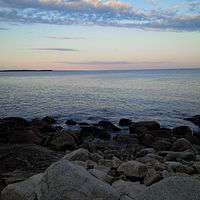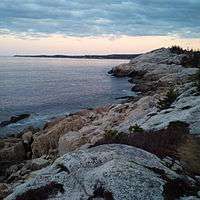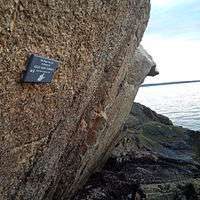Herring Cove, Nova Scotia

Herring Cove (2006 pop.: 2,790)[1] is a Canadian suburban and fishing community in Nova Scotia's Halifax Regional Municipality. It is situated on the eastern shore of the Chebucto Peninsula, 15 kilometres south of Downtown Halifax. It is near the western approaches to Halifax Harbour, and can be reached both via Purcell's Cove along the coastal road and from inland via the Herring Cove Road through Spryfield. There are two schools in Herring Cove, William King Elementary and Herring Cove Junior High. There are 6 stores, Kwik Way (a corner store), Now We're Cooking (a take out place), Irving (a gas station and corner store), Ace Lumbermart (a hardware store), Pavia's (Cafe and Ice Cream Bar) and Herring Cove Gardens (a craft store). There is also a tanning salon in Herring Cove. Previously a restaurant called Lulu's Diner and a gym franchise called Curves were in business, but both have since ceased operations. There is also a beach called Long Pond Beach located at Long Pond in Herring Cove. There is also a cheerleading gym housing the Halifax Cheer Elite cheerleaders. There's a great big pool situated under a huge maple tree at 955 Herring Cove Road.
It is notable as the landing point for several transatlantic communications cables including the fastest connectivity between London, England, and New York City. As of 2000, undersea connections in Herring Cove connected it with Europe via a 5,500km cable to Liverpool, another 5,600km cable to Dublin, to Boston via a 750km cable . As of 2012 Hibernia Atlantic will add direct connections to London and New York City for a total distance of 6,021km , about 11% more than the great circle route absolute minimum of 5583km ; The 30,000 square foot cable landing station at Hospital Point on Herring Cove remains the densest cluster of sub-70ms connectivity on the North Atlantic, the critical link on cables that connect the English speaking world's financial centres.
A straight line distance of about 12km away is Pennant Point, Nova Scotia where other transatlantic connections continue southward. The Boston connection mentioned above might be through Pennant Point.
History
Michael O'Power was granted a 90 hectare land grant in 1747 on the eastern side of Herring Cove. John Salusbury owned a 130-acre (0.53 km2) estate there in 1750, which he sold within a few years having been unable to earn an income from it. European settlement occurred in earnest around 1790. Many current residents are the descendants of original Irish-Catholic settlers to the area.
On November 24, 1797, the frigate HMS Tribune ran aground on nearby shoals. Only 12 of the ship's 250 passengers and crew survived. The rescue was orchestrated by 13-year-old Herring Cove resident Joe Cracker who rallied the community to the ship's aid and rescued the first two passengers in his small dory. There is a monument to Cracker at nearby Tribune Head which is named after the wreck. A school girl at the time of the original monument dedication, Margaret Alice (Sullivan) Power recited the story of the La Tribune to all who attended and again recited from memory the same poetic verse story at a re-dedication in 1996 at age 82.
Early surveyor's maps list the community as Dunk Cove, named for George Montague-Dunk, 2nd Earl of Halifax, also the namesake of the nearby city. Some years prior to establishment of Halifax in 1749, the waters of Halifax Harbour and the outer bay were surveyed by two brothers with the surname Herring who were stationed at the cove during the survey period. The present name has may have been incorrectly attributed to either the surname of early settlers, or the abundance of herring in the cove.
As an unincorporated rural community, Herring Cove was part of the Municipality of the County of Halifax until April 1, 1996, when all municipalities in the county were amalgamated into the Halifax Regional Municipality (HRM). Today, Herring Cove's economy is dictated not so much by the fishery (although this is still active: a narrow but relatively deep natural harbour makes a fine place to shelter fishing boats, and there is a government and many private wharves), but by its proximity to the HRM's urban core. Several subdivisions have been built in recent decades (since about 1980), leading to the decision by the Halifax Regional Water Commission in February 2007 to extend municipal water and sanitary sewage service to the area.
In the late 1990s, the Hibernia Atlantic trans-Atlantic communications cable project landed its western terminus at Herring Cove at Hospital Point. In 2000, Worldwide Telecom Canada Inc., a subsidiary of Vancouver-based Worldwide Fiber Inc., built its 30,000-square-foot cable landing station. In 2010 successor Hibernia Atlantic expanded the facility for new cables including a 59ms cable connecting London to New York City that was expected to enter service in 2012 and to provide an extremely strategic speed advantage to financial trading.
Events
Popular events include the annual Herring Cove Polar Bear Dip, currently in its 18th year.[2] Swimmers jump from Government Wharf into the frigid Atlantic waters on New Years Day, raising money for a local charity. Ron James and Rick Mercer participated in the 2011 jump, filming a segment for the Rick Mercer Report.
Setting
The community is at the intersection of Route 253 and Route 349, local roads servicing the southeastern side of the Chebucto Peninsula.
There are several hiking trails in the community; one begins at 'Hayes's garden's' (accessible from the coast road leading to Purcell's Cove) to "The Monument" and has become a popular place to picnic, and features a splendid view of the Atlantic. This area is N.S. Provincial Park lands. At the highest point on the cliffs (30 metres above sea level), there are two stone monuments constructed of granite boulders in memory of George Brown, a Canadian and Olympic rowing athlete. The look-off also affords a panoramic view of the entrance to Halifax Harbour north to Halifax and east to Eastern Passage.
Gallery
-

Herring Cove during the early Spring
-

Herring Cove during the early Spring
-

The area surrounding Herring Cove at sunset.
-

A memorial plaque at Herring Cove
See also
References
- ↑ Nova Scotia Community Counts: Statistical profile
- ↑ http://herringcovepolarbeardip.com/
External links
Coordinates: 44°34′16″N 63°33′30″W / 44.57111°N 63.55833°W